- Home
- Laura Purcell
Bone China Page 19
Bone China Read online
Page 19
She raised an eyebrow. ‘Such as they were.’
He laughed and began to choke.
Louise went to assist him, but he held out a hand to stop her. It seemed Harry had his pride too.
She uncorked the wound water and soaked a clean handkerchief while he composed himself. There was fighting spirit in the young man. Afflicted with consumption, hit by a rockfall and still trading repartee? That did suggest they had caught him in time. Even if they lost Michael and Tim, just one cure would be enough.
‘Sit still now,’ she ordered, kneeling at his side. ‘I will wash it and dress it with a balsam. I did intend to make you a cold compress, but I forgot we have no ice house here.’
‘Such privations.’ He mimicked her accent – rather too closely for comfort.
‘Do not test me, sir.’ She brandished the wet handkerchief. It reminded her of forcing her younger siblings into line; how she had needed to cajole and threaten at the same time. ‘I can make this much more painful than it needs to be.’
Evidently he believed her, for he pushed the dark hair back from his face and tilted his chin up to the light. She had thought his eyes were green. At this moment they appeared grey, little chinks of slate. Cautiously, she began to wash around them. He did not close the lids.
His skin was rusty with dried blood and took a while to clean. He did not complain, just sat, as if for his portrait, letting her touch flow over him.
‘Your nose may set a little crooked, I’m afraid.’
‘Hardly matters, does it?’
‘Less for a man, I suppose. And it will lend you a certain notorious aspect, which I understand is very desirable.’
‘It won’t matter because I’ll be in my coffin.’
Her hands began to shake. She busied herself with the balsam to conceal it.
‘I wish you would not speak like that,’ she said sadly, ‘as if all this were for nothing. We have high hopes for you, Harry.’
He turned away.
‘Come here.’ She began to smooth the balsam over him. It had a deep herbal scent. ‘You might tell me, instead, what you will do with your freedom when you recover.’ She saw the gentle motion of her hands soothed his temper, took a little of the anger away. ‘I do not know how you ended up in Bodmin but—’
‘No.’ Less prickly now, just weary. ‘Don’t start that. What is it about you rich folk? Always after remaking someone. When I saved your dog, I just did it. No conditions, no fanfare. Done. If I live, I an’t going to be a different person. I was a fence before I went in, and I’ll be a fence if I get out.’
She was not certain she had heard right. ‘A … fence?’
That curled his lips. ‘So bloody innocent. You know, a fence. I take things in, melt them down, change them up. Pass it off as something new.’
‘What kinds of things?’
‘Hot things. Wipers, jewellery, silver jugs, all that.’
‘Stolen goods?’ Even she heard the note of disapproval in her voice.
He guffawed. ‘How the hell do you think I ended up in gaol?’
Louise was not used to being spoken to in this manner. It shocked, but did not upset her. It made her feel strangely alive.
She was alive. Her heart was beating, her knees were aching and a man was swearing at her. After so long staring at death, she had begun to feel that she had stepped behind the veil herself.
She placed the lid back on the balsam and made ready to gather her skirts.
Then Harry spoke again. ‘Who’s Louisa?’
‘What?’
He must have seen the way her face turned rigid, for there was a dart of panic in his eyes. ‘The doctor calls you Louise. But who is Louisa?’
‘It was my mother’s name,’ she said tightly. ‘Why do you ask?’
Harry’s mouth drooped. He looked sorry he had spoken. ‘Doesn’t matter.’
‘Why?’
‘He … says it sometimes. In his sleep. Or to himself.’
Unconsciously, Louise placed a hand on her chest. ‘She died,’ she whispered. ‘They all died.’
Harry shifted awkwardly against the wall of the hut. He made a movement, as if he was going to clap her on the shoulder, but seemed to think better of it.
‘Well, it happens. He an’t an old man. Give him time, he’ll marry again.’
Many daughters would fear such a thing. Not Louise. She would be only too glad to assure herself that Papa’s life would move on in a different direction, but she knew him better than that.
‘He will not. He … You do not know how it was, between them.’
Harry looked down at his hands. ‘Chough,’ he muttered.
‘I beg your pardon?’
‘The choughs in the cliff. Did you never see them? Red beaks. We hear them all the time, down here.’
‘I know the bird.’
‘It pairs for life,’ he told her. ‘That’s what my ma always said. Same mate, same place, every year. Always come back. Maybe your da’s like that.’
She was afraid to speak lest the tears spill. The truth was, it was easier to take blows on her own account than watch Papa suffer. She had cried far more for him than herself.
‘And what about you?’ he asked. ‘You and that damned dog?’
‘I will assist my father,’ she said briskly. ‘He needs someone to serve as apothecary.’
‘But for how long? He’s not old. By the time he … you know, joins your ma, it’ll be too late to start a family of your own.’
‘That does not signify. The hospitals employ nurses to live in all the time. They prefer an older lady without dependants.’
Harry sighed. ‘High-bred lass like you, working in one of them rough places? Don’t sound like much of a life to—’
‘What is that?’ Before she considered what she was doing, she seized his hand, pulled it under the lamplight. There was a blotch and a kind of scribble next to it, as if someone had drawn on him in red ink. ‘That? How long has it been there?’
He inspected it. ‘Don’t know. Could it have happened when the rocks hit me?’
‘I would be surprised. It is more like a rash and that … that next to it is certainly not a scratch. A scratch could not twist itself so. Does it hurt?’
Pulling his hand away, he shrugged. ‘Everything hurts. I’ve got the consumption, an’t I?’
‘Do not be so difficult, Harry. I am concerned. It is a very strange mark.’
‘There’re a lot of strange things in this cave,’ he said darkly.
And at that, he got up and left her.
PART FIVE
Potent Liquids
Chapter 26
We must set off early to make our way into ‘town’. Dawn trembles upon the horizon. The moon is still at large, refusing to be cowed. No clouds obscure its milky glow. It seems set to be a bright day.
Our pony is eager to be on the move. He paws the grass, breath pluming from his nostrils. Although his winter coat has grown thick on his rump, he clearly still feels the cold. One would need to be made of stone to ignore it. I am exceedingly lucky that Merryn has lent me her cloak.
Three people just about fit on the trap. The backwards seat, where I put my trunk on the journey down, will serve us for any packages we bring home. Gerren initially places himself in the middle, but Mrs Quinn is much larger, so he ends up pushed towards the right-hand side with me anyway. Even in the fresh, salty air, I can smell the tobacco on his coat. This morning, I do not mind. I am grateful for his warmth.
Gerren loosens the reins and the pony springs to life. The wheels wobble. I remember the winding road up the cliff and gulp.
Behind us, Morvoren House is shuttered and sightless. I gaze over my shoulder, keeping it in view until we sink downhill, deep into the darkness. Miss Pinecroft will still be there, in the china room. I hope Merryn will be kind to her in my absence, help her to drink her morning chocolate.
I have more potent liquids to pursue.
We do not take the Falmouth road. I am gla
d, for that would be an arduous journey. It crosses my mind to ask our destination, but the name of the town would mean nothing to me.
As we travel inland, a pink pearly light begins to wash up the sky and a very different Cornwall materialises before my eyes. Here there are no raw cliffs or craggy rocks, only hills sliding from green to gold. Hedgerows and stone walls tease the eye in every direction. Far away, the flues of tin and copper mines pierce the horizon.
This land is fertile; there are a great quantity of trees. Some have twisted to odd shapes in the wind, all of them are bare, and yet they give me the impression life is slumbering, just waiting to erupt.
The sound of the sea fades. I can still smell and taste the salt, but I no longer feel it shredding my cheeks. Sir Arthur’s acquaintance would call such a landscape picturesque. They would marvel over its untamed romance. I prefer the formal gardens of London with their straight lines and patterns. What I would not give now to see a fountain or a trained and pruned privet hedge. Everything neatly controlled.
‘Nearly there,’ Mrs Quinn announces, making me jump.
From a distance, I see a hotchpotch of whitewashed houses surrounding a bay. Narrow streets twist uphill to more buildings, some of them rough cast like Morvoren House but much smaller. I push back the hood of Merryn’s cloak. It does not appear so much a town as a large fishing village.
Entering the bustle of streets feels strange after my three days on the clifftop. Descending a steep lane, we pass a rope maker and a chair mender to stop outside an inn. Its walls are embroidered with the remains of ivy.
My spirits lift.
Mrs Quinn is already making her way down from the trap with a basket hooked over her arm, eager to be about her business. Gerren points to the stone church tower, close by the water.
‘Back by two bells,’ he says.
The inn will bait the pony, and it seems as if Gerren intends to spend his time in the taproom smoking. This is no cause for alarm – any manner of shops may sell me gin.
Together, Mrs Quinn and I make our way over the cobbles. A man drives sheep in the opposite direction. This is a busy village, a boat-making village, the housekeeper informs me. There are certainly signs of small industry: women mending nets, children dashing about with pails. Boats bob at anchor in the bay.
‘Walk with me to save growing lost,’ she offers. ‘I’ll show you about, but first I’ve to visit the bank for the mistress, and Mrs Bawden has a fancy—’
‘Please, do not trouble yourself. I have an excellent sense of direction.’ Seeing her mouth droop, I add hastily, ‘I should only get in your way. I do so hate to make a nuisance of myself.’
Mrs Quinn hesitates. ‘’Tis your choice. Only wait outside the church when you’re done, and I’ll meet you there.’ She hands me a small purse of coins and cups my fingers tight around them. ‘Be careful. I shouldn’t like you to fall in the way of any rough folk.’
I nod, as if she is very wise. ‘I shall be cautious. Living in London certainly taught me that.’
Living in London has also taught me to appreciate this view of the sky: a great bowl overhead, clouds draped across it like lace on blue silk. I do not remember ever seeing so much of it.
I wander at random. A woman bundled up in a threadbare shawl eyes me warily. The butcher’s boy stops to watch my progress, a parcel of bloody meat dripping in his hands. I raise the hood of Merryn’s cloak over my face again. I daresay I appear strange to these people. Dressed simply though I am, my gown is a world apart from their mud-splattered boots and darned clothes. These people have known hard times. The wars have been kind to no one, and our Regent is not famed for his consideration of the lower classes. I see the cracks cut into their hands by salt, and remember reading of bread riots in Truro. Circumstances have improved, but not greatly.
For me, it is quaint to wind through this little village, up and downhill as the erratic cobbles dictate. Whether it is the freedom from Morvoren House, the bright day or the prospect of gin that charms me, I am certainly happier than I have been for a long while.
I locate an apothecary without much trouble. His premises are small and grimed with dirt at the windows. There is a seedy appearance to him. The bottles are dusty about the shoulders, the weighing scales tarnished. He sells a variety of quack nostrums, the Venice turpentine and syrup of maidenhair I need, and he can even supply my gin from under the counter. Once, I would despise such a man. Hester Why thinks him a capital fellow.
Uncorking the gin bottle with my teeth, I press it against my lips. I have spent laudanum-weary nights dreaming of this moment, but the reality is better.
I find a fence to lean against and watch a small boy selling packets of newspapers. He struggles to keep them from taking off in the breeze. It seems fitting that he is here. A newspaper started me drinking, after all. That advertisement, still hidden in my trunk. God knows why I have kept it. To feel wanted, perhaps, sought after.
I take another sip of gin.
It is unbearable to imagine Lady Rose out there in the world, despising me. But even worse is the possibility that she does not think of me at all.
In the distance, a church clock chimes. My time is running out. I decant the bottle I am holding into my empty hip flask; the other I wrap carefully in an extra shawl and place at the bottom of my basket. I need to cushion it as thoroughly as it cushions me. Mrs Quinn must not hear the telltale chink.
I nearly make it: go straight to the church and meet Mrs Quinn. But as I pass the boy, my footsteps slow. He pushes the salt-matted hair from his eyes and looks up at me with a world of hope.
Somehow my hand is already in my pocket. I have just enough left after buying the gin. Sick with anticipation, I press the coins into his print-stained palm.
The packet tears in the wind and the foolishly large pages beat frantically like the wings of a netted gull. I consider crumpling the newspaper into my basket and taking it up again once we are home. But that is a trial of patience my nerves will not stand.
I reach the society pages first. My eyes scan the print eagerly for news of her. A certain duchess has been seen sporting a new hat … One of the Prince Regent’s outriders lost his way in the fog and fell into a ditch … There will be a musical gathering in the Queen’s Concert Rooms …
And then comes the sensation of falling.
It is worse than that day in Salisbury. So much worse.
The boy swims at the edge of my vision. ‘Miss?’
I have just enough time to set my basket down upon the cobbled pavement. Then the world turns mercifully black.
Chapter 27
They have all been exceedingly kind. That has only made it harder to bear. When Mrs Quinn clucked over me and wrapped her shawl about my shoulders for the journey home, I wanted to scream at her. Does she not understand that I deserve no tenderness? Does she not see the rot at my very core?
My hands shake worse than ever, and it has nothing to do with gin. Much as I try to hide my emotions, Merryn knows something is awry. I see it in her sideways glances as I mix the chocolate like an automaton.
‘If thee an’t well enough to work …’ she begins.
‘I am quite recovered, thank you.’
‘Mrs Quinn says thee went down hard yesterday …’
‘I had simply not eaten enough,’ I snap.
Performing my duties is torture, but I would rather have them to focus on. If I were left alone in that salt-ringed bedroom with my newspapers, my snuffbox and my memories … I think I would drown myself in gin. Dram by dram.
I pour the chocolate into a cup that has two handles and a lid to keep it warm.
Merryn takes a breath, but I leave the kitchen before she can speak again.
When I am in the west wing, halfway down the corridor leading to the china room, a familiar scent reaches me: cardamom. I stop dead, my hands shaking on the tray. I have mixed the chocolate as Lady Rose would take it, by mistake.
It is all I can do not to break down in sobs.
<
br /> After a few minutes, I regain something like composure. I balance the tray on one unsteady hand, open the door and step inside the china room. It is like plunging into a pool of icy water.
Never before have I felt a cold like this: sharper than any blade.
A violent gust slams the door behind me and I scream. Dust swirls in clouds across the floor. The curtains flail and I realise what has happened: Miss Pinecroft has opened the window.
This is too much.
‘Confound it!’ I cry, slamming the tray upon a side table.
I run to close it. Damp has warped the wooden frame of the sash and it initially refuses to budge. Shoving aside the billowing curtains with one arm, I pull at the wood until my fingernails crack. At last, with a great whoosh, it gives way and slides shut.
The wind dies. The curtains slap back into place. Outside I can see the ocean, writhing with glee, as if this were all a game.
‘Of what were you thinking, madam?’ I demand. ‘All the care I take of you, and you wish to undo it! For what? What reason could you possibly have?’
I round upon my mistress.
Miss Pinecroft’s spine is poker-straight. She clenches the arms of the chair. Her hair is blown awry and she looks terrified.
As if she is afraid something will rip her from her seat.
‘Miss Pinecroft? What …?’
Glancing down at her hands, my stomach turns over.
Her wrinkled fingers have twisted themselves into the shape of birds’ talons. Her nails are broken, worse than my own.
Gouged deep in the armrests are thin white lines. As jagged as the fissures in the jasperware cup.
*
What troubles me most is the fact that I screamed when the door slammed behind me, then I harangued my mistress in a manner deserving instant dismissal: I was loud and clamorous, but no one came. No one heard me above the tossing of the sea.
It occurs to me that if Miss Pinecroft should fall while I was out of the room, I would not hear her either. I would be too late to help.
And I must help her. Even if I achieve no other good. The thought steadies me. If I can be of use to this poor lady, who can barely hold her chocolate in her freshly bandaged hands, it will be my atonement.

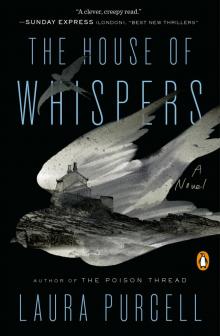 The House of Whispers
The House of Whispers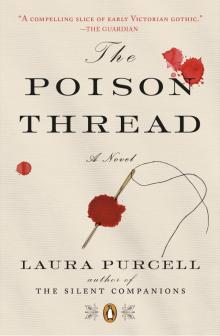 The Poison Thread
The Poison Thread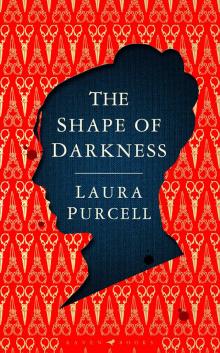 The Shape of Darkness
The Shape of Darkness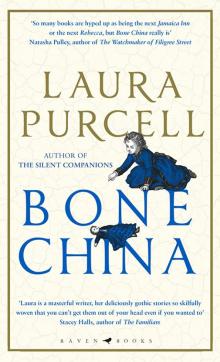 Bone China
Bone China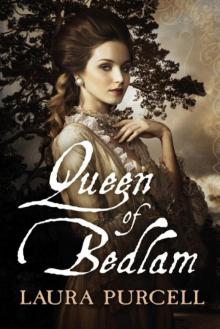 Queen of Bedlam
Queen of Bedlam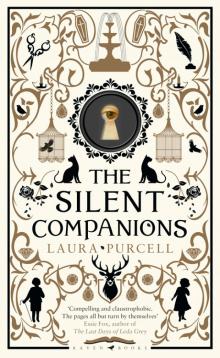 The Silent Companions
The Silent Companions